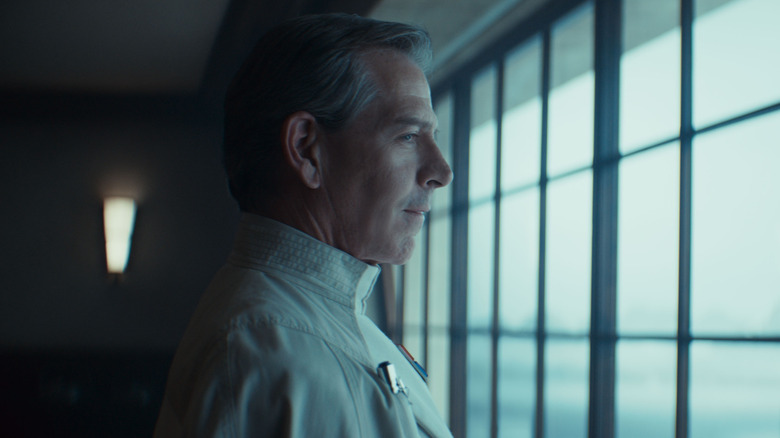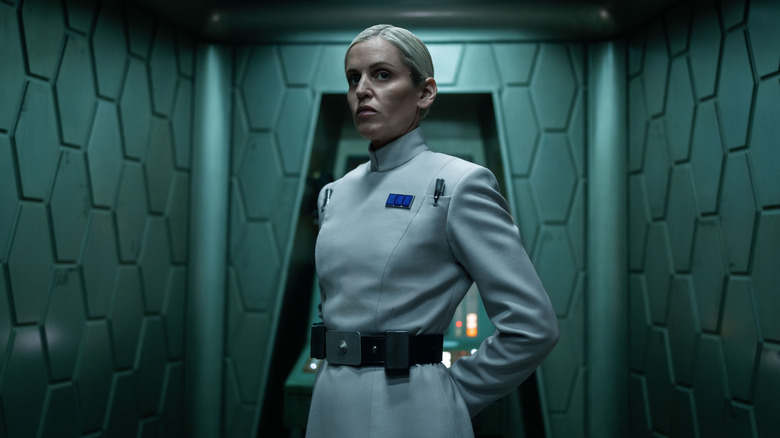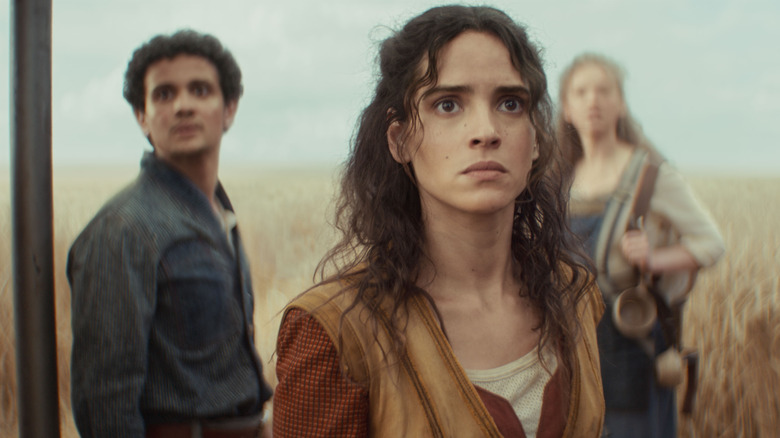How Andor Season 2 Brings Real-World Horrors Into The Star Wars Universe
Warning: This article contains spoilers for the first three episodes of "Andor" season 2 and discusses the potentially triggering topic of sexual assault.
"Andor" has never been a series to do anything halfway. Where the rest of the "Star Wars" franchise has rarely had the time or interest in diving too deep into the practicalities and politics of an Empire ruling over an entire galaxy (and the one time it did, well, we got the prequels), this spinoff/prequel show has never once shied away from shining a light on the real face of oppression. Whether it be season 1's exploration into the banal fanaticism of characters like Syril Karn (Kyle Soller) and his trusted Sergeant Linus Mosk (Alex Ferns), the career-minded Dedra Meero (Denise Gough) climbing the Imperial bureaucratic ladder, or the systematic oppression of the native population on Aldhani, every villain has their own motivations and reasons for lending their support to authoritarianism. And, just as in our own history, the sheer and simple humanity of it all only makes it even more terrifying.
Season 2 has picked up this same thread and run with it, as I wrote in my review "Andor" for /Film here, and it only takes a few scenes into the premiere episode to realize how much deeper it goes. In fact, this approach to drawing on real-world horrors appears to be a concentrated focus throughout the first three episodes overall, all of which dropped at once in this season's new release strategy.
It starts when we're provided a window into the most casual boardroom conversation about attempted genocide depicted in all of "Star Wars," as Dedra and Major Partagaz (Anton Lesser) are summoned to discuss what to do about the planet Ghorman and the underground mineral deposits they need to excavate to fuel the Emperor's "energy project." In episodes 2 and 3, we return to the trio of Bix (Adria Arjona), Brasso (Joplin Sibtain), and the droid B2EMO (Dave Chapman) on Mina-rau peacefully hiding from the Empire — until a random audit puts "undocumented" workers like themselves squarely in the sights of local patrols. When this all culminates in episode 3, with one of the most distressing moments in the entire franchise, it's painfully clear what "Andor" has on its mind.
With each one of these subplots, "Andor" season 2 brings headlines from our own world straight into the "Star Wars" universe ... and it's all the more effective for it.
Andor season 2 tackles genocide without flinching
Calling a secret office meeting to calmly and rationally discuss the possibility of exterminating (or forcibly removing) an entire populace before breaking for lunch might seem like the stuff of mustache-twirling villainy, but "Andor" presents this with a startling sense of matter-of-factness. It takes some patience to figure exactly what the Empire is up to here, as we're first asked to sit through a jovial news reel depicting Ghorman's industry of choice: the manufacturing of a threadlike substance known as Ghorman Twill. There turns out to be a much more sinister reason behind the Empire's interest in the planet, however. The presence of invaluable minerals below ground means they're willing to do anything to get their hands on it — up to and including genocide.
The mere fact that "Andor" is willing to pay off the hints of Ghorman from season 1 and actually call out the Empire's intentions for what they are says a lot, as does its casual depiction of Imperial officers treating this like simply another day at the office. There's "just following orders," and then there's "brainstorming ways to be more creative about following orders in between rounds of hors d'oeuvres." For instance, one officer flippantly talks about how introducing a plague or staging a natural disaster to get the natives to leave of their own accord is more trouble than its worth.
Meanwhile, we're introduced to an entirely new branch of the government known as the Ministry of Enlightenment — a not-so-subtle allusion to Nazi Germany's own Ministry of Propaganda and Public Enlightenment. And, of course, there's Dedra's own blinkered mission to further her own agenda. Her side conversation with Director Krennic (Ben Mendelsohn) is galling in how mundane it is, quietly planting the seeds for manipulating a rebel insurgency on Ghorman to stir things up and provide themselves cover for greater atrocities to come.
Viewers will have to wait a few weeks to see the payoff to all this setup, but there's something unmistakably chilling about carrying out a genocide in secret while planning ahead to twist public perception once it becomes public. As the Oscar-winning documentary "No Other Land" proves emphatically, this is hardly the stuff of fiction. In "Andor," that only makes it feel even more true to life.
Andor season 2's most traumatic subplot is uncomfortably real
Bet you never thought you'd see a Disney-era "Star Wars" production wade into the same kinds of discourse currently engulfing the political and social arena these days, but "Andor" is nothing if not made of surprises. Creator/writer Tony Gilroy and his writing team somehow got away with sneaking in some of the most overt commentary in the entire franchise, thanks to the subplot taking place on the planet Mina-Rau. It's easy to imagine a version of "Andor" that forgot all about Cassian's (Diego Luna) dearest friends — Bix, Brasso, Wilmon (Muhannad Ben Amor), and B2 — but, thankfully, that couldn't be further from the truth. In fact, Gilroy makes them the epicenter of one of the most harrowing sequences in the entire season.
While hiding out incognito from the Empire on this little-known backwater planet, the survivors from Ferrix encounter their worst nightmare in the form of an Imperial audit and kickstart one of the show's most effective storylines. Tactualhe dialogue goes out of its way to classify our good guys as "undocumented" workers without a visa or any other kind of identification, which puts them at risk of the invaders descending upon their rural town and obviously calls to mind debates surrounding contemporary immigration. The show doesn't merely use this as window-dressing, however, but goes a step further by highlighting the absurdity of it all. The local Imperial goon, Lieutenant Krole (Alex Waldmann), actually admits that the planet needs undocumented workers in order to thrive and implies he's willing to look the other way ... if only Bix gives him what he wants. The attempted sexual assault that follows lends a frighteningly human face to all the Empire's widespread abuses, all through the actions of a single depraved man. If this doesn't seem timely or real, that's only because you're not looking hard enough.
In the process, "Andor" season 2 accomplishes what no other "Star Wars" movie or show has ever done before. The franchise has never felt more timely or more politically potent. In the weeks to come, fans may be shocked by how much further this series pushes the envelope.
If you or anyone you know has been a victim of sexual assault, help is available. Visit the Rape, Abuse & Incest National Network website or contact RAINN's National Helpline at 1-800-656-HOPE (4673).


